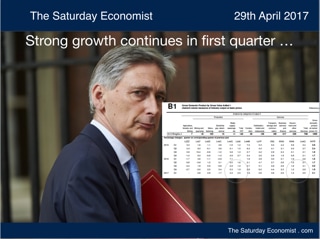 The preliminary estimate for GDP in the first quarter of the year was released on Friday. The headline from the ONS was "the slowest rate of growth since" ... last year. UK GDP was estimated to have increased by just 0.3% in the quarter, compared to the prior three months. Growth is slowing according to most lead headlines today in the business pages today. But is it? As readers of The Saturday Economist know, we prefer to look at the year on year growth rates and not the quarter on quarter comparison. Recent quarter data is adjusted far too often to be reliable as a quick snap guide. The year on year growth rate for manufacturing was 2.8%. The year on year growth rate for production output was 2.5%. The year on year growth rate for services was 2.5%. Construction output increased by 1.9%. The weighted growth rate for the economy as a whole in the first quarter of the year must have been 2.4%. A growth rate of 2.4% compares to growth of just 1.8% in 2016. Manufacturing output is boosted by strong output in the car sector. Strong growth is reflected in the fall in government borrowing. The ONS overall growth figure (year on year) as published is just 2.1%. That's a statistical impossibility given the strong contribution from production, services and construction accounting for 99% of total output. Strong growth continues into the first quarter of the year. We expect growth of between 2% and 2.4% for the year as a whole. US growth in the first quarter was 1.9%. Sterling is rallying against the Dollar as the reality of a rate hike in the UK is dawning and the prospects for Fed rate hikes is waning ... In other news this week ... Government Borrowing falls to £52 billion in 2016/17 Government borrowing fell to £52 billion in the financial year down by £20 billion from prior year. Public Sector Net Debt was £1.73 trillion, up by £123.5 billion in the period equal to 86.5% of GDP. Current receipts increased by 6% in the period boosted by strong growth in income tax and NIC contributions. VAT revenues were relatively modest given the low inflation outlook over the twelve months. Current spending increased by just 2% over the period. The Treasury has secured a prime fiscal surplus based on current revenue and spending out turns. So what of the years ahead? The OBR expects borrowing in the current financial year to increase to £58 billion, thereafter reducing to £41 billion in 2018/19. Given the drive to achieve an overall surplus in the next parliament, there will be little to give away in the Tory manifesto, although a further five year mandate will extend the timetable slightly if required. As it is, government borrowing could be eliminated within four years. Best month since 2000 for UK car manufacturing ... Exports continue to drive British car manufacturing in March as demand increased by 11% in the month according to the latest data from the SMMT. Overseas demand, accounting for over three quarters of sales, helped to push overall production to a 17 year high as output hit 471,695 units. Mike Hawes, Chief Executive said, "UK car manufacturing is accelerating thanks to the billions of pounds of investment committed over the last few years. Much of our output goes to Europe and it is vital we maintain free trade between the UK and the EU or we risk destroying this success story." 1.7 million cars were built in the U.K. in 2016 of which 70% were exported to the EU and the rest of the world. Output in 2017 is expected to increase to 1.8 million units as growth in the World and European economies continues. Car production and sales are interconnected with the EU. Motor, aerospace, finance and big pharma are the sectors most at risk from a "hard" exit. Negotiators would be wise to heed the Hawes call ... So what happened to Markets? The Dow closed at 20,950 from 20,566. The FTSE closed at 7,224 from 7,114. Sterling was up against the Dollar to $1.294 from $1.279 and was down against the Euro to €1.187 from €1.197. The Euro moved up against the Dollar to 1.089 from 1.068. Oil Price Brent Crude closed at $51.64 from $51.72. The average price in April last year was $41.58. UK Gilts - yields moved up. UK Ten year gilt yields closed at 1.10 from 1.05. US Treasury yields moved up to 2.32 from 2.25. Gold closed at $1,269 from $1,286. John That's all for this week. Don't miss our economics update at PwC Manchester on the 18th May. It's usually a sell out so make sure you book now! © 2017 John Ashcroft, Economics, Strategy and Social Media, experience worth sharing. ______________________________________________________________________________________________________________ The material is based upon information which we consider to be reliable but we do not represent that it is accurate or complete and it should not be relied upon as such. We accept no liability for errors, or omissions of opinion or fact. In particular, no reliance should be placed on the comments on trends in financial markets. The receipt of this email should not be construed as the giving of advice relating to finance or investment.. ______________________________________________________________________________________________________________ If you do not wish to receive any further Saturday Economist updates, please unsubscribe using the buttons below or drop me an email at [email protected]. If you enjoy the content, why not forward to a friend, they can sign up here ... _______________________________________________________________________________________ For details of our Privacy Policy and our Terms and Conditions check out our main web site. John Ashcroft and Company.com _______________________________________________________________________________________________________________ Copyright © 2017 The Saturday Economist, All rights reserved. You are receiving this email as a member of the Saturday Economist Mailing List. You may have joined the list from Linkedin, Facebook Google+ or one of the related web sites. Our mailing address is:
0 Comments
 "Poor Retail Sales Raise Fears of a Brexit Slump" the headline in The Times today. Tom Knowles, Economics Correspondent, suggests the slowdown in the British economy has begun, after the sharpest fall in retail sales in seven years. Really? Sure enough, the volume of goods sold in March increased by just 1.7% in the month and by just 2% in the first quarter of the year. This time last year sales volumes were racing along at over 4%. Inflation was muted. Spending in money terms, increased by just 1.6%. CPI inflation averaged 0.4% and goods inflation was negative. Should we really be too concerned by the headline drop in volumes? Perhaps not. An early Easter in March last year boosted sales volumes in the month and in the quarter comparison. Fuel sales were down by 4.5% in March this year, Easter travel plans delayed. Consumer spending in value terms increased by over 5% in March and 4.8% in the first three months of the year. Consumers are spending more to buy less in terms of volumes. Retail Price inflation in the March basket was 3.3% largely driven by an increase in petrol prices (up 16%). Excluding petrol, retail prices increased by 2.6%. Clothing and footwear sales increased by 6%, online sales increased by 20% accounting for 16% of all retail sales. No household income squeeze apparent in the retail sales figures, forget fears of a slowdown for now ... In other news this week ... The IMF upgraded forecasts for the world economy to 3.5% in 2017 and 3.6% in 2018. Forecasts for UK growth were upgraded to 2% from earlier estimates of 1.1% and 1.5%. Despite fears of rising inflation and household income squeeze, strong growth is set to continue according to the IMF head Christine Lagarde. Rising inflation and stronger growth are beginning to convince MPC member Michael Saunders of the need to raise rates much sooner than expected. In a speech to the Federation of Small Business this week, Saunders suggested growth and inflation in 2017 could be higher than the Bank of England forecast in February. He also suggested rates at 0.25% were already "accommodative" and would need to rise. Kristin Forbes has already broken ranks and called for a rate hike to 0.5%, reversing the August move last year. The hawks are gathering on the MPC. In "other news" the Prime Minister called a snap election in June. Capitalising on a twenty point lead in the polls and the prospect of a near 100 seat majority in the house, the move is designed to out-manoeuvre Labour and back bench dissidents in the Tory party. Any EU deal will be a result of tough negotiations with the EU group and tougher negotiations with the Conservative parliamentary group. Better a bigger majority to convince doubters to accept the outcome of any deal. A mandate for Brexit? Not really. 48% of voters voted remain and one third of Conservative voters wanted to stay. Will tactical voting boost the Lib Dem vote? Will the move lead to the Scotland's separation and the unification of Ireland? Another hustings cliff hanger in the short months ahead. The Tories could even lose the election warns Tory strategist Lynton Crosby ... Four legs good, two legs bad ... or is it two legs ... The US announced this week, the EU would be bumped ahead of the U.K in any trade deal. Despite the preference for bilateral deals, President Trump has been forced to accept a deal with Germany could not be achieved without an overall agreement with the trade bloc. Despite asking Merkel many times for a one on one deal, the German Chancellor stayed firm to the cause. Perhaps this explains the sulky reluctance to shake hands before the camera during the White House visit. TTIP is back on the agenda along with a love for the EU, NATO, the IMF and the World Bank. Like some Orwellian conversion, the four legs good, two legs bad mantra is yielding to the reality of life in Animal Farm and the White House Zoo. How do you influence President Trump on policy? Try to be the last man (or woman) standing on two legs before a policy statement is made. The Italian Prime Minister Paolo Gentiloni received the treatment this week. Welcomed to the White House, Trump reads a list of national characteristics like the anchor on a reality show introducing a hapless contestant. "The timeless contribution of Italy to civilization and human progress, stretching all the way back to ancient Rome, your nation has been a beacon of artistic and scientific achievement, from Venice to Florence, from Verdi to Pavarotti (a friend of mine ... a great friend of mine), history and culture have only grown stronger because we are great friends and allies... Cynical to point out Pavarotti has been dead for ten years. Strong allies" the Italian Prime Minister asked Trump to step up his commitment to Libya. A hasty and undiplomatic response followed. Would the US take a greater rôle in Libya? Trump replied I have enough rôles. Pretending to be President probably the most demanding but Syria, Iran, Korea, Japan, Russia ... it's tough being President of the United States. Trump has a flair for offending friend and foe alike. Following conversations with President Xi, Trump had learned Korea was once part of China! OK, you would have to go back as far as the Ming Dynasty for confirmation. Korea had also been part of Japan at the turn of the century. The South Korean government was alarmed. A possible Beijing annexation of the North Korea back in the agenda? Some relief the Easter Pyongyang crisis had been averted. To discover the U.S armada was sailing in the wrong direction at the time of the White House call to action, still a cause for some concern. The picture of the Easter bunny on the White House balcony is our photo of the week ... The bunny looking slightly more shocked to be with the leader of the free world ... That's all for this week from The West Wing, Whisky, Tango, Foxtrot ... You can check out the series of blog posts here So what happened to Markets? The Dow closed at 20,566 from 20,453. The FTSE closed at 7,114 from 7,327. Sterling was up against the Dollar to $1.279 from $1.253 and was up against the Euro to €1.279 from €1.1179. The Euro moved up against the Dollar to 1.068 from 1.062. Oil Price Brent Crude closed at $51.72 from $55.64. The average price in April last year was $41.58. UK Gilts - yields moved down. UK Ten year gilt yields closed at 1.05 from 1.057. US Treasury yields moved down to 2.22 from 2.232. Gold closed at $1,286 from $1,286. John That's all for this week. Don't miss our economics update at PwC Manchester on the 18th May. © 2017 John Ashcroft, Economics, Strategy and Social Media, experience worth sharing. ______________________________________________________________________________________________________________ The material is based upon information which we consider to be reliable but we do not represent that it is accurate or complete and it should not be relied upon as such. We accept no liability for errors, or omissions of opinion or fact. In particular, no reliance should be placed on the comments on trends in financial markets. The receipt of this email should not be construed as the giving of advice relating to finance or investment.. ______________________________________________________________________________________________________________ If you do not wish to receive any further Saturday Economist updates, please unsubscribe using the buttons below or drop me an email at [email protected]. If you enjoy the content, why not forward to a friend, they can sign up here ... _______________________________________________________________________________________ For details of our Privacy Policy and our Terms and Conditions check out our main web site. John Ashcroft and Company.com _______________________________________________________________________________________________________________ Copyright © 2017 The Saturday Economist, All rights reserved. You are receiving this email as a member of the Saturday Economist Mailing List. You may have joined the list from Linkedin, Facebook Google+ or one of the related web sites. Our mailing address is: The Saturday Economist, Tower 12, Spinningfields, Manchester, M3 3BZ, United Kingdom. 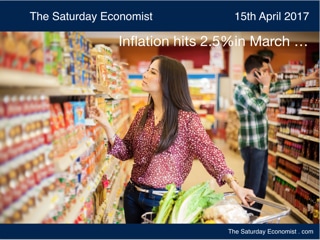 Goods inflation jumped to 2.5% in March up from 1.9% prior month. The headline rate of inflation CPI held at 2.3% due to a surprise drop in service sector inflation. Service sector inflation fell from 2.8% in February to 2.1%. It's hard to see why. A 23% drop in air travel costs assisted the fall but doesn't explain the overall drop. Had service sector inflation held at 2.8%, the overall inflation rate would have been 2.6%. That's well above the Bank of England target. We expect a bounce back in prices in the next couple of months towards our 3% forecast. Producer output prices increased by 3.6% in March and input costs eased slightly to 17.9% from 19.4% in February. The inflationary combination of rising oil prices and the fall in Sterling is beginning to ease as the first quarter 2016 lows in Brent Crude Oil work out of the year on year comparison. The Bank of England remains relaxed about the rise in inflation. The expected acceleration in earnings is not evident in the latest data for February. More economic news this week ... Earnings in the three months to February increased by just 2.3% according to the latest ONS data. The real level of earnings reduced to zero as CPI inflation hit the same level. Should we worry about household spending in the second half of the year? Maybe! Household incomes may be squeezed if inflation continues to rise but then again earnings may rise to offset the price increases. Worth pointing out perhaps retail sales values increased by 6.4% in the same month. No sign of a spending or activity slow down just yet. Last week our headline "Strong growth continues into the first quarter caused a few comments. Asked to commit to a number for growth, we expect growth to be between 2.3% and 2.5% in the first quarter. Inset is our estimate of GDP(O). It is not rocket science, more simple arithmetic. Assuming no radical revisions to the ONS data already released, output is likely to have increased by 2.5% in the first three months of the year. Unemployment fell to 1,559 thousand in February down from 1,584 prior month. It is at the lowest level since Q3 2005 when inflation was 2.8% and base rate was 4.5%. The unemployment rate in February was unchanged at 4.7%, the number of vacancies increased to 767,000. At peak in February 2008 and immediately before recession, the level was just below 700,000. Recruitment difficulties are increasing, the pressure for pay increases is rising, the tide is set to turn in the earnings market. Growth 2.5%, inflation 2.5%, unemployment falling, vacancies at a record high, now is the time to begin the process or rate normalization. The absurd process of corporate bond purchases should be abandoned. The market is thin, the products heterogeneous, do we really believe Apple and IBM need assistance to reduce the cost of borrowing? In the US Trump may place some pressure on Janet Yellen to avoid further rate hikes. The weak jobs growth in March may assist. Inflation is muted, retail sales growth is slowing, forecasters are trimming US growth expectations for 2017. Markets still expect two more rate rises this year. In the U.K. the Bank should act to cap the spread against the green back ... Don't Miss The West Wing, Whisky, Tango, Foxtrot this week ... You can check out the series of blog posts here So what happened to Markets? The Dollar slipped on the Trump call. The Dow closed at 20,453 from 20,711. The FTSE closed at 7,327 from 7,349. Sterling was up against the Dollar to $1.253 from $1.238 and was up against the Euro to €1.179 from €1.1168. The Euro moved up against the Dollar to 1.062 from 1.059. Oil Price Brent Crude closed at $55.64 from $55.19 The average price in April last year was $41.58. UK Gilts - yields moved down. UK Ten year gilt yields closed at 1.05 from 1.07. US Treasury yields moved down to 2.23 from 2.32. Gold closed up at $1,286 from $1,255. John That's all for this week. Don't miss our economics update at PwC Manchester on the 18th May. © 2017 John Ashcroft, Economics, Strategy and Social Media, experience worth sharing. ______________________________________________________________________________________________________________ The material is based upon information which we consider to be reliable but we do not represent that it is accurate or complete and it should not be relied upon as such. We accept no liability for errors, or omissions of opinion or fact. In particular, no reliance should be placed on the comments on trends in financial markets. The receipt of this email should not be construed as the giving of advice relating to finance or investment.. ______________________________________________________________________________________________________________________________ For details of our Privacy Policy and our Terms and Conditions check out our main web site. John Ashcroft and Company.com _______________________________________________________________________________________________________________ Copyright © 2017 The Saturday Economist, All rights reserved. You are receiving this email as a member of the Saturday Economist Mailing List. You may have joined the list from Linkedin, Facebook Google+ or one of the related web sites. Our mailing address is: The Saturday Economist, Tower 12, Spinningfields, Manchester, M3 3BZ, United Kingdom. 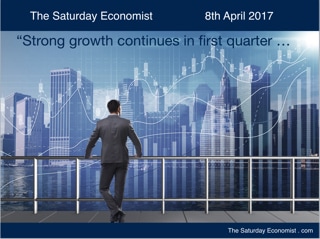 Strong growth continues in first quarter of the year ... Strong growth continued into the first quarter of the year according to the latest batch of economic news. The NIESR monthly estimate of GDP was released yesterday. Despite the apparent slowdown into March, the year on year comparison suggests GDP growth was over 2% in the first quarter. Manufacturing data for February confirmed growth was 3.3% compared to prior year. We expect manufacturing growth in the first three months to be 2.9%. Strong growth, partly a statistical blip, for the year as a whole, we expect growth of 1.5% in 2017, compared to 0.8% last year. The latest Markit/CIPS PMI data series were released for March. Manufacturing output and new orders continued to expand in the month. The headline index closed at 54.2 down from 54.5 in February, still well above the long term growth trend of 51.6. Price pressures remain "elevated" in March. The pressure on input and output prices continue. The construction survey suggested weaker housing growth weighed on overall sentiment in the month. Despite a pick up in commercial activity, the headline index fell to 52.2 from 52.4. ONS construction data confirms growth slowed in February. The fall in public sector housing and infrastructure spending continue to offset the strong growth in private sector housing and commercial real estate. More economic news this week ... The service sector continues to drive growth in the economy. Market/ CIPS data confirms the strongest rise in activity so far in 2017. The index closed at 55.0 from 53.3 prior month. Growth in new work continues but price pressures are increasing. The survey noted the strongest price pressures since 2008! Resilient demand is enabling cost pass through. Respondents also noted stronger salary pressures in the month, ahead of the April pay round. UK car sales increased by 8.4% in March. Private sales increased by 4.4%. Fleet and business sales increased by 12%. 562,337 cars were registered in the month, an all time high for the third month of the year. Sales may have been boosted by the hike in Vehicle Excise Duty in April. The SMMT remains cautious for the year as a whole. House prices slowed in March according to the Halifax and Nationwide data. House prices in the three months to March increased by 3.8% compared to 5.1% in February according to The Halifax. Comparable figures for Nationwide were 3.5% and 4.5%. Evidence of a slowdown? Not really. Sooner or later house price increases must fall back towards the overall level of earnings growth. The affordability index can only be stretched so far. The trade deficit (goods) increased in February to £12.5 billion from a revised £12.0 billion in January. We expect the deficit in the first quarter of the year to be over £36 billion compared to £32.3 billion last year. A deficit of £145 billion this year seems possible, up from £134 billion in 2016. The rise in service sector surplus will mitigate the overall net impact on the goods and services deficit. Strong growth, rising inflation, salary pressures, trade deficits, base rates at 0.25%? Spot the odd one out. In the US job growth slowed in March. A disappointing 98,000 jobs were added compared to the 236,000 average in 2017. The unemployment rate fell to 4.5%. The Fed is still expected to raise rates at least twice this year. This week, MPC member Gertjan Vlieghe suggested UK rates could be on hold for another two years ... West Wing ... Whisky Tango Foxtrot ... It has been another tough week for the President. Steve Bannon (Chief Strategist) was dropped from the National Security Council. General McMaster delivered the coup de grace. It could get worse. The President is considering sacking Steve Bannon and Reince Priebus as a West Wing feud continues. Jared Kushner (son in law) and Steve Bannon appear to be locked in a White House power struggle. Ivanka née Trump will provide the running commentary into the Oval Office! The stakes are rising in the winner takes all game. Family first the guideline, Jared is odds on favourite to pull through. Horrified by footage of victims of the gas strike in Syria, the President ordered the release of 59 Tomahawk missiles on the suspect airbase. An attack on the Assad regime, the missile strike is a reversal of White House policy and a shock to Congress. A clear warning to Syria and perhaps North Korea, the President has raised the stakes in international diplomacy. The rapprochement with Russia suffered a severe setback. The norm of Iranian alienation restored. Turkey, Saudi Arabia and Israel applauded the move. What next the key question. Weakening the Assad regime will boost the prospects of Isis and terrorism generally. Further measures are not excluded but options are limited without significant escalation of the confrontation with Russia. President Xi was in Florida this week. Talks about trade and North Korea were expected. The visit has been subject to a virtual news black out. Agreed photo ops, the defined hand shake moment, a ban on Trump tweets during the visit perhaps, the Chinese delegation must have thought they had all the bases covered. Not so the Syrian airbase, a ban on missile attacks during President Xi's visit was omitted from the small print. "I haven't gotten much yet" joked the President in the early stages of the trip. A state visit to China later in the year the agreed outcome revealed! "God Bless America and the whole world", the President closed his press statement on the Syrian strikes. Is the President now prepared to walk on the world stage with Tomahawk missiles in hand? Syria, Yemen, Afghanistan and North Korea should tremble, if the President gets a taste for action and the approval ratings respond. "God Bless America and 'Heaven' Help the Whole World" if that is the case. That's all for this week from the West Wing Whisky Tango Foxtrot ... So what happened to Markets? The Dow closed at 20,711 from 20,712. The FTSE closed at 7,349 from 7,322. Sterling was down against the Dollar to $1.238 from $1.253 and was down against the Euro to €1.168 from €1.172. The Euro moved down against the Dollar to 1.059 from 1.069. Oil Price Brent Crude closed at $55.19 from $52.69 The average price in March last year was $41.58. UK Gilts - yields moved down. UK Ten year gilt yields closed at 1.07 from 1.12. US Treasury yields moved down to 2.32 from 2.41. Gold closed up at $1,255 from $1,247. John That's all for this week. Don't miss our next economics update at PwC Manchester on the 18th May. © 2017 John Ashcroft, Economics, Strategy and Social Media, experience worth sharing. ______________________________________________________________________________________________________________ The material is based upon information which we consider to be reliable but we do not represent that it is accurate or complete and it should not be relied upon as such. We accept no liability for errors, or omissions of opinion or fact. In particular, no reliance should be placed on the comments on trends in financial markets. The receipt of this email should not be construed as the giving of advice relating to finance or investment.. ______________________________________________________________________________________________________________ If you do not wish to receive any further Saturday Economist updates, please unsubscribe using the buttons below or drop me an email at [email protected]. If you enjoy the content, why not forward to a friend, they can sign up here ... _______________________________________________________________________________________ For details of our Privacy Policy and our Terms and Conditions check out our main web site. John Ashcroft and Company.com _______________________________________________________________________________________________________________ Copyright © 2017 The Saturday Economist, All rights reserved. You are receiving this email as a member of the Saturday Economist Mailing List. You may have joined the list from Linkedin, Facebook Google+ or one of the related web sites. Our mailing address is: The Saturday Economist, Tower 12, Spinningfields, Manchester, M3 3BZ, United Kingdom. 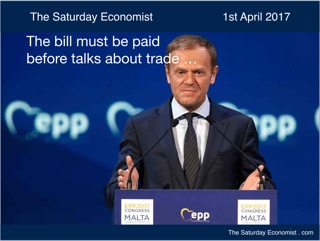 The Prime Minister signed the letter triggering Article 50 this week. We are leaving the European Union. Theresa May made clear, we are not leaving Europe. Excellent! How would that work exactly? We still want to be friends with our European allies with a "deep and special" relationship in the future. This will include a Free Trade Deal and an immigration cap, especially on people from Eastern Europe. Promising. The response from President Tusk was clear. There can be no discussions on future relationships until "satisfactory" progress has been made on the separation agreement. The EU will make the call as and when the time is right. There can be no cherry picking. No special "sector" deals. Nothing is agreed until everything is agreed. The EU will act in its own interests. The negotiations will be collective, with no bilaterals. The EU seeks a close partnership in the future but will be prepared to "walk" if no deal is secured. The UK seeks to secure an ambitious Free Trade agreement with the EU. President Tusk makes it clear a Free Trade Deal is on the table, as long as certain conditions are met. Mutual guarantees relating to rights of EU citizens in the UK and UK citizens in the EU is one. It is more or less a given. The big and perhaps only problem will relate to the "sordid topic of coin". A single financial settlement must be made to reflect "obligations" undertaken before the date of withdrawal. The bill must be paid before talks about trade. The Prime Minister has made it clear, payment will be made. But how much? The quantum paid will have to satisfy the demands of the EU and the Tory back benches. Ah there's the rub. Nothing is agreed until everything is agreed. How long will it take? "Negotiations extend into the time available" is the general norm. Two years less the time for ratification is the guideline. Ratification by 37 EU national and regional parliaments on the one side, approval from the Tory hard liners and Westminster on the other. Ratification will eat into the time slot. Who will win the ratification race? Can one side ratify in isolation? There may be an "I will if you will" moment in the months ahead. Gratuitous insertions about Spain and Gibraltar, the EU and Eire will raise eyebrows and temperatures amongst Eurosceptics in the UK. Demands for a second referendum in Scotland will provide additional complication. Reasserting the Spanish right to veto as far as the Gibraltar is concerned, will merely wave a red (and yellow) flag to Tory bulls. Economic news this week ... The ONS released the latest update for UK growth in the final quarter of 2016 on Friday. There were but modest revisions in the data. Overall growth remains at 1.8% for the year as a whole, fueled by consumer spending and leisure sector output. Imports increased by 2.8%, exports grew by 1.8%. The trade deficit grew to £37 billion compared to £30 billion in 2015. The savings ratio fell to just over 3%. Concerns about household debt are increasing. The service sector is driving recovery, with over 5% growth in the leisure sector. Construction increased by 2.4%, manufacturing output increased by just 0.7%. The current account deficit increased to 4.4% of GDP compared to 4.3% in 2015. The ONS may provide some solace in the deficit reduction to just 2.5% of GDP in the final quarter. Let's not get too excited just yet. The data is volatile and subject to revision. For the year as whole, we expect growth to continue into 2017. Growth of 2% to 2.4% still appears to be possible. Inflation is on the rise but an earnings increase will offset the real income squeeze for households. The latest Nationwide house price data suggests house prices fell in March compared to the month earlier. Should we worry about that? Not really! The year on year growth slowed to 3.5% from 4.5% prior month, still significantly ahead of earnings and impacting on the affordability index. Will Brexit fears impact on growth? Hopefully not. We expect an amicable separation agreement, leading to a transition period and a free trade deal. No hard landing. No WTO rules. Motor, aerospace, financial services and big pharma may have to pay the price of a new global Britain, West Wing ... Whisky Tango Foxtrot ... It has been another tough week for the President. Tired and cranky, Trump walked out of an Executive Order signing ceremony at the end of the week, without signing the Executive Order!. Difficult questions about Mike Flynn's immunity caused the President to leave the party and retreat to private quarters. Suffering from the healthcare bill set back, Trump blamed the Democrats not offering any votes to support the badly drafted bill. "We had no democrat support, we had no votes from the democrats, they weren’t going to give us a single vote. It was a very difficult thing to do. It really would have worked out better if we had some Democrat support." Of course it would. Even better had the Republicans followed the whip! Trump declared war on the Freedom Caucus this week. Thirty right wing republicans essential for any majority in the house. "We learned a lot about the vote getting process, so for me it been a very interesting experience": said Trump this week. Who would have thought the Democrats would vote against the bill to abolish Obama care. "Doing big things is hard" explained Paul Ryan. "Health care is complicated" added Trump. Who would have thought running a country could be so difficult. International relations are about to become more difficult. Next week the Chinese are in Florida. President Xi won't be staying at Mar-A-Lago. He's worried about bugging and wire taps! Ironic! That's all for this week from the West Wing Whisky Tango Foxtrot ... So what happened to Markets? The Dow closed at 20,712 from 20,634. The FTSE closed at 7,322 from 7,336. Sterling was up against the Dollar to $1.253 from $1.2439 and was up against the Euro to €1.172 from €1.156. The Euro moved down against the Dollar to 1.069 from 1.080. Oil Price Brent Crude closed at $52.691 from $50.81 The average price in March last year was $41.58. UK Gilts - yields moved down. UK Ten year gilt yields closed at 1.12 from 1.21. US Treasury yields held at 2.41. Gold closed unchanged at $1,247. John That's all for this week. Don't miss our next economics update in Manchester on the 18th May. © 2017 John Ashcroft, Economics, Strategy and Social Media, experience worth sharing. ______________________________________________________________________________________________________________ The material is based upon information which we consider to be reliable but we do not represent that it is accurate or complete and it should not be relied upon as such. We accept no liability for errors, or omissions of opinion or fact. In particular, no reliance should be placed on the comments on trends in financial markets. The receipt of this email should not be construed as the giving of advice relating to finance or investment.. ______________________________________________________________________________________________________________ If you do not wish to receive any further Saturday Economist updates, please unsubscribe using the buttons below or drop me an email at [email protected]. If you enjoy the content, why not forward to a friend, they can sign up here ... _______________________________________________________________________________________ For details of our Privacy Policy and our Terms and Conditions check out our main web site. John Ashcroft and Company.com _______________________________________________________________________________________________________________ Copyright © 2017 The Saturday Economist, All rights reserved. You are receiving this email as a member of the Saturday Economist Mailing List. You may have joined the list from Linkedin, Facebook Google+ or one of the related web sites. Our mailing address is: The Saturday Economist, Tower 12, Spinningfields, Manchester, M3 3BZ, United Kingdom. |
The Saturday EconomistAuthorJohn Ashcroft publishes the Saturday Economist. Join the mailing list for updates on the UK and World Economy. Archives
July 2024
Categories
All
|
| The Saturday Economist |
The material is based upon information which we consider to be reliable but we do not represent that it is accurate or complete and it should not be relied upon as such. We accept no liability for errors, or omissions of opinion or fact. In particular, no reliance should be placed on the comments on trends in financial markets. The presentation should not be construed as the giving of investment advice.
|
The Saturday Economist, weekly updates on the UK economy.
Sign Up Now! Stay Up To Date! | Privacy Policy | Terms and Conditions | |
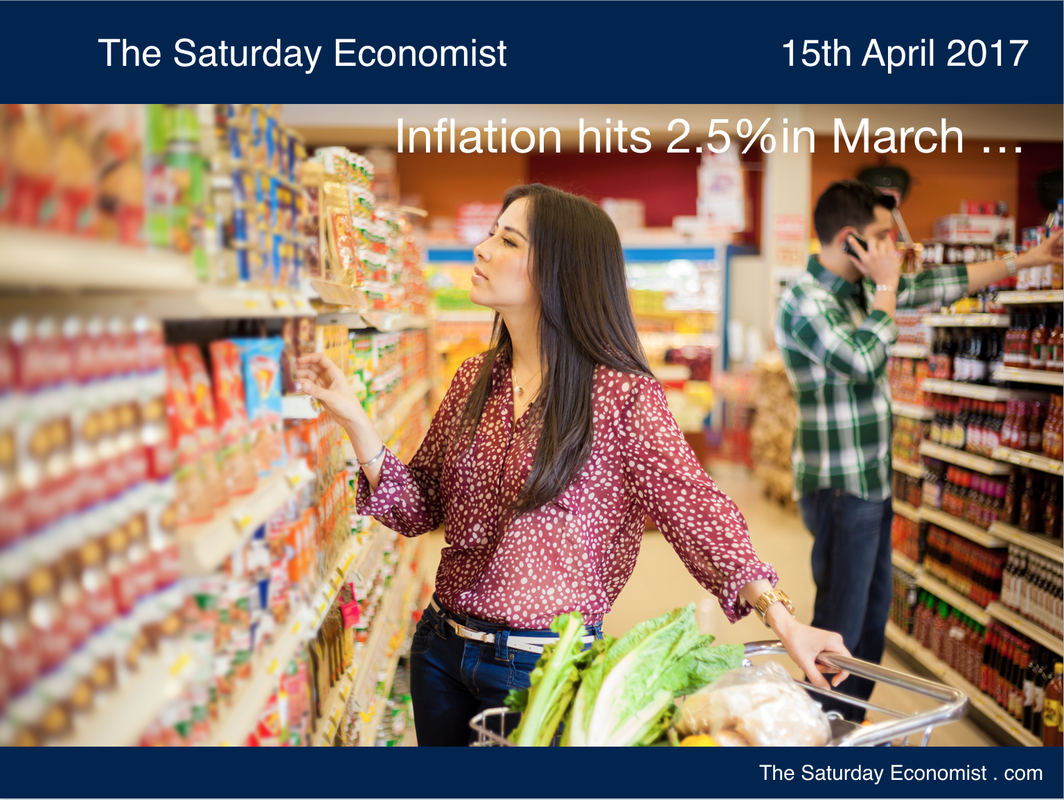
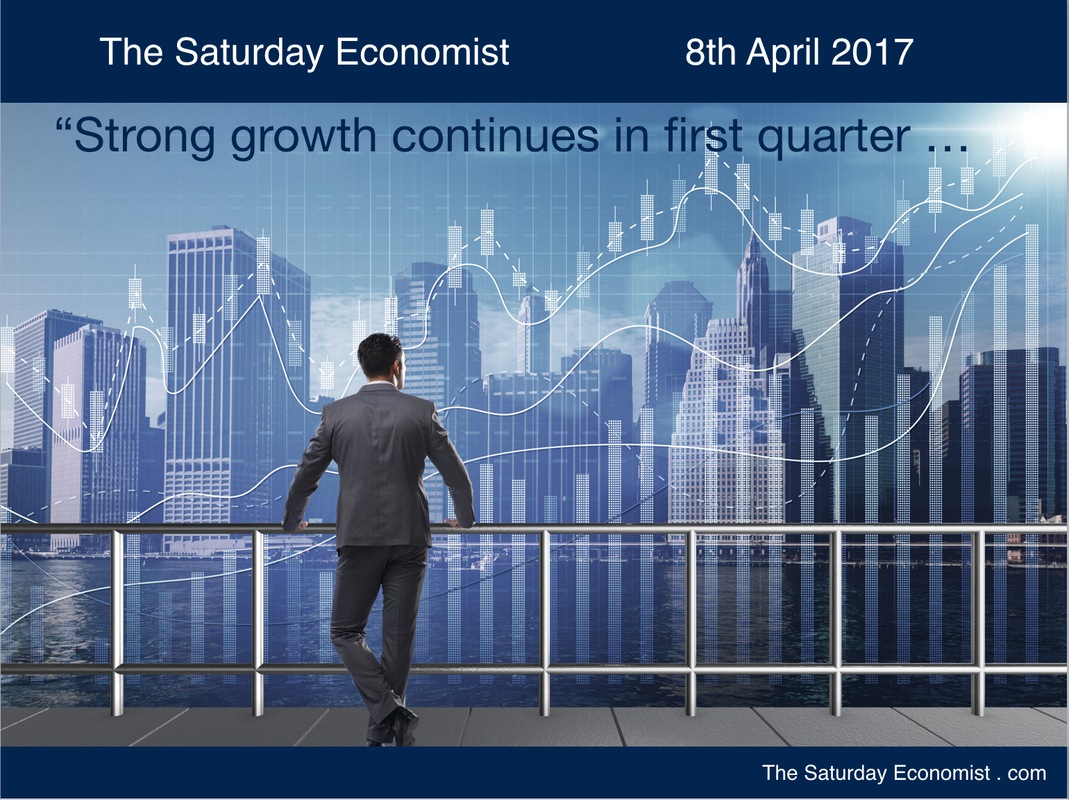
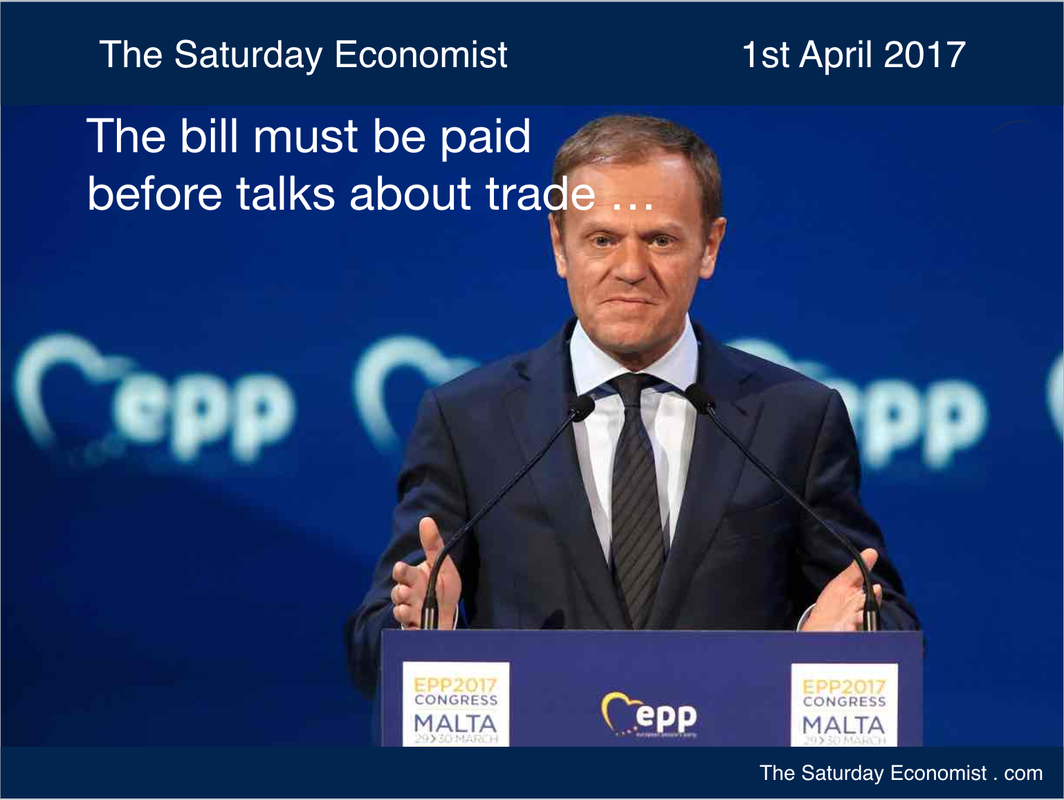
 RSS Feed
RSS Feed